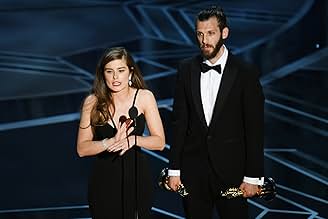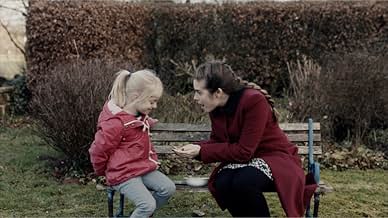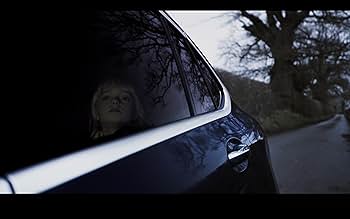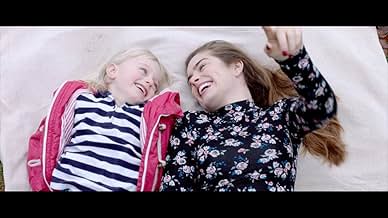VALUTAZIONE IMDb
7,7/10
3129
LA TUA VALUTAZIONE
Aggiungi una trama nella tua linguaA deaf 6-year-old girl named Libby lives in a world of silence until a caring social worker teaches her to use sign language to communicate.A deaf 6-year-old girl named Libby lives in a world of silence until a caring social worker teaches her to use sign language to communicate.A deaf 6-year-old girl named Libby lives in a world of silence until a caring social worker teaches her to use sign language to communicate.
- Regia
- Sceneggiatura
- Star
- Vincitore di 1 Oscar
- 25 vittorie e 8 candidature totali
Recensioni in evidenza
'THE SILENT CHILD': Four Stars (Out of Five)
A 20-minute short film about a four-year-old deaf girl, who's assigned a social worker to help her learn sign language, but her skeptical parents are highly resistant to it. This short was directed by Chris Overton and written by Rachel Senton. It's well made, but it's also quite depressing and frustrating at times too. The film deals with some annoyingly bigoted parents, that you learn to really dislike throughout the short (or at least I did). I also learned to really care for the young deaf girl though. It's well made and insightful too.
A 20-minute short film about a four-year-old deaf girl, who's assigned a social worker to help her learn sign language, but her skeptical parents are highly resistant to it. This short was directed by Chris Overton and written by Rachel Senton. It's well made, but it's also quite depressing and frustrating at times too. The film deals with some annoyingly bigoted parents, that you learn to really dislike throughout the short (or at least I did). I also learned to really care for the young deaf girl though. It's well made and insightful too.
Introduction: The short film The Silent Child (2017), 20m, a brilliant low budget film ($10k) made by Chris Overton, with a pleasant play and a fantastic multi-layered screenplay of Rachel Shenton, great cinematography by Ali Farahani, and impressive music composed by Amir Konjani, was truly deserved to achieve the title of the best short film at the Oscars 2018.
Plot theme: The theme of the first layer of the film can be seen as a detailed and pathological approach to the problems of deaf or hard-of-hearing children. Only the very same sentence that Joanna hears from Paul that the reason why she was called to this house, hasn't been to understand Libby but to help Sue feel more comfortable in controlling affairs, can represent the depth of the problem of these children. The filmmaker plays his impressive role well by presenting brief but tragic statistics in the end credits of the film. Although this layer of the film is capable of a detailed critique of the exact details of the plot, cinematography, and music of the film, I prefer to have a metatextual look at the symbolic theme (second layer) of the movie in my short opportunity because it may be in shadows and less visible.
Meta-textual layer: In my view, this film with its elaborate use of symbols and characters, expresses another story of reason in opposition with love, and warns against the fall of the meaning of life and the tragedy of forgetting love! Some of these used symbols are:
The mother as the motherland, procreation, and affairs of sensory including reason. She is an entire and full-time controller who is very willing to turn anything into her own language and logic, in order to master it. With this ignorance, she misses the opportunities in front of her to accept the special language of love (Libby) and enjoy this tenderness, and even considers the messenger of this truth (Joanna) as a disturbing threat.
The deaf child (Libby) as the element of Love, the innocent child that is silent from speech but susceptible to miracles, she is from an unknown lineage and the result of the bond of odd but alien love!
The helper girl in red (Joanna) as an element of femininity, who understands love and finds it (Libby) easily behind every tree while the closest members of her family are unable to understand her.
The family and society as ego and superego, a language structure powered by laws and ideals, but just bring busyness and coldness of daily routine, and its members only seek to weaken the other and acquire a position of greater power and control.
Sign-language as a symbol of the intuitive love language.
The school, a symbol of prison show which imposes a dictatorial regime on its captives to restrain love and homogenize all members of the society of the modern world.
The filmmaker has depicted the presence and absence of love on the roads of Joanna's route with sensory and visual presentation, and the audience subconsciously finds the atmosphere of the movie foggy or clear in accordance with hiding or finding love during the story. It can be seen that all the names of the story have been chosen very carefully according to the mentioned symbols. By reflecting on the roots and the origins of the names of the characters such as Libby, Joanna, Sue and Paul can find the deep connection of these choices in the role of the types of the story. This approach even leads us to the third and more sublime layer of the film's theme, which is not possible in this review.
A thought-provoking open-end: The intelligent and brilliant open-end in the film after the romantic display of expressing love between Libby and Joanna from behind the bars of the school (the prison) raises this question for the audience: What will the end be like? Do you really want to know what happens to Libby? Will this remain a full-blown tragedy? The answer is up to you, it depends on what you will do to free up your Libby...
Plot theme: The theme of the first layer of the film can be seen as a detailed and pathological approach to the problems of deaf or hard-of-hearing children. Only the very same sentence that Joanna hears from Paul that the reason why she was called to this house, hasn't been to understand Libby but to help Sue feel more comfortable in controlling affairs, can represent the depth of the problem of these children. The filmmaker plays his impressive role well by presenting brief but tragic statistics in the end credits of the film. Although this layer of the film is capable of a detailed critique of the exact details of the plot, cinematography, and music of the film, I prefer to have a metatextual look at the symbolic theme (second layer) of the movie in my short opportunity because it may be in shadows and less visible.
Meta-textual layer: In my view, this film with its elaborate use of symbols and characters, expresses another story of reason in opposition with love, and warns against the fall of the meaning of life and the tragedy of forgetting love! Some of these used symbols are:
The mother as the motherland, procreation, and affairs of sensory including reason. She is an entire and full-time controller who is very willing to turn anything into her own language and logic, in order to master it. With this ignorance, she misses the opportunities in front of her to accept the special language of love (Libby) and enjoy this tenderness, and even considers the messenger of this truth (Joanna) as a disturbing threat.
The deaf child (Libby) as the element of Love, the innocent child that is silent from speech but susceptible to miracles, she is from an unknown lineage and the result of the bond of odd but alien love!
The helper girl in red (Joanna) as an element of femininity, who understands love and finds it (Libby) easily behind every tree while the closest members of her family are unable to understand her.
The family and society as ego and superego, a language structure powered by laws and ideals, but just bring busyness and coldness of daily routine, and its members only seek to weaken the other and acquire a position of greater power and control.
Sign-language as a symbol of the intuitive love language.
The school, a symbol of prison show which imposes a dictatorial regime on its captives to restrain love and homogenize all members of the society of the modern world.
The filmmaker has depicted the presence and absence of love on the roads of Joanna's route with sensory and visual presentation, and the audience subconsciously finds the atmosphere of the movie foggy or clear in accordance with hiding or finding love during the story. It can be seen that all the names of the story have been chosen very carefully according to the mentioned symbols. By reflecting on the roots and the origins of the names of the characters such as Libby, Joanna, Sue and Paul can find the deep connection of these choices in the role of the types of the story. This approach even leads us to the third and more sublime layer of the film's theme, which is not possible in this review.
A thought-provoking open-end: The intelligent and brilliant open-end in the film after the romantic display of expressing love between Libby and Joanna from behind the bars of the school (the prison) raises this question for the audience: What will the end be like? Do you really want to know what happens to Libby? Will this remain a full-blown tragedy? The answer is up to you, it depends on what you will do to free up your Libby...
"The Silent Child," Chris Overton, Rachel Shenton - A beautiful film with an important message about how deaf children need support and assistance in life and in school in order to develop fully to their potential, and the serious negative consequences that lack of support can have. I found this film to be quite touching. Beautifully directed, acting was phenomenal. Rachel Shenton should be a star. This is my personal pick for the live-action short film Oscar.
I watched this in a sign language class at my college. I've always wanted to communicate well with deaf people and this film shows why that is so important.
The feelings of loneliness expressed by the young actress are true to life. Many deaf ones cannot communicate with the general public, not because they don't want to, but because no one understands them. This film captures that and provides a powerful message why we need to try harder to include the deaf community by trying to communicate with them. The Silent Child is an amazing and emotional film that needs to be seen. It's realism is outstanding and it's message compelling. Thoroughly deserved the Oscar.
The feelings of loneliness expressed by the young actress are true to life. Many deaf ones cannot communicate with the general public, not because they don't want to, but because no one understands them. This film captures that and provides a powerful message why we need to try harder to include the deaf community by trying to communicate with them. The Silent Child is an amazing and emotional film that needs to be seen. It's realism is outstanding and it's message compelling. Thoroughly deserved the Oscar.
What a wonderfully made and beautiful movie. I am a 38 year old male reduced to tears within minutes. Well done on bringing awareness in such a beautiful way. Can't stop thinking about the movie.
Lo sapevi?
- QuizRachael Shenton signed along with her Academy Award acceptance speech (using British Sign Language BSL) after making a promise to her co-star Maisie Sly, that she would do so if they won.
- ConnessioniFeatured in The Oscar Nominated Short Films 2018: Live Action (2018)
I più visti
Accedi per valutare e creare un elenco di titoli salvati per ottenere consigli personalizzati
Dettagli
- Data di uscita
- Paese di origine
- Siti ufficiali
- Lingue
- Celebre anche come
- La niña silenciosa
- Luoghi delle riprese
- Aziende produttrici
- Vedi altri crediti dell’azienda su IMDbPro
Botteghino
- Budget
- 10.000 £ (previsto)
- Tempo di esecuzione20 minuti
- Colore
- Proporzioni
- 2.35 : 1
Contribuisci a questa pagina
Suggerisci una modifica o aggiungi i contenuti mancanti

Divario superiore
By what name was The Silent Child (2017) officially released in Canada in English?
Rispondi




















